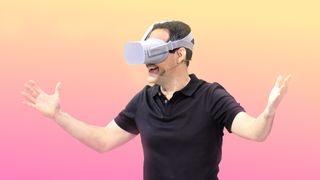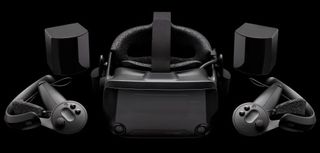Working in VR is more stressful and lessens productivity. Big surprise
Doing your day job in the metaverse sounds like a real pain. Turns out, it is.

Companies like Meta have been putting a lot of weight into the idea of a digital exodus. There's a lot of talk that working in distraction free, virtual environments could be the future. But as it stands today, researchers say that working in virtual reality is overwhelming, frustrating, and unproductive.
The paper, 'Quantifying the Effects of Working in VR for One Week' (PDF warning) takes a deep dive into the viability of working long term in a virtual environment (via New Scientist). Participants, all of which were employees or researchers at a university, were asked to work in VR for an entire week.
The results were less than positive.
Participants were asked to work using Chrome Remote Desktop, which if my personal experience is anything to go by was likely half the usability problem. Jokes aside, the researchers opted for an Oculus (Meta) Quest 2 VR headset, so participants could use the hand tracking with a physical keyboard—a Logitech K830 with integrated trackpad.
Part of the reasoning behind not using the absolute highest spec headset around, was to go for "a setup delivering a comparable experience to working in the physical desktop environment."
Most people, as it happens, don't have $2,399 to drop on a 12K Pimax VR headset, let alone the PC spec to run it.
Before they even got into the bulk of testing, the study notes "concerning levels of simulator sickness" and "below average usability ratings." Two subjects even dropped out on day one because they were experiencing nausea, migraines, and anxiety. Not a great start.
PC Gamer Newsletter
Sign up to get the best content of the week, and great gaming deals, as picked by the editors.
Those left worked eight hour days, with 45 minutes to recuperate and inhale some lunch. Each of them scored their VR working experience against working in a physical environment, and it turns out many felt their task load had increased, on average by 35%. Frustration also shot up by 42%, the 'negative affect' stat was up 11%, and anxiety went up by 19%.

Best VR headset: which kit should you choose?
Best graphics card: you need serious GPU power for VR
Best gaming laptop: don't get tied to your desktop in VR
All in all, mental wellbeing was reported to have decreased by 20%. Putting a number on this sort of stuff is tough, but that doesn't sound like a particularly healthy score. And the physical side of things wasn't much better. Eye strain was up 48%, and VR ranked 36% lower on usability. On top of all that, participants self-rated workflow went down by 14% and their perceived productivity dropped by 16%.
The research will help the process as we move into a more VR-laden world, by "clearly highlighting current shortcomings and identifying opportunities for improving the experience of working in VR."
Last year we put to record six things VR is really good at now. The list included fitness and wellbeing, and even virtual travel—work, unsurprisingly, was not on the list.

Screw sports, Katie would rather watch Intel, AMD and Nvidia go at it. Having been obsessed with computers and graphics for three long decades, she took Game Art and Design up to Masters level at uni, and has been demystifying tech and science—rather sarcastically—for three years since. She can be found admiring AI advancements, scrambling for scintillating Raspberry Pi projects, preaching cybersecurity awareness, sighing over semiconductors, and gawping at the latest GPU upgrades. She's been heading the PCG Steam Deck content hike, while waiting patiently for her chance to upload her consciousness into the cloud.
Most Popular







